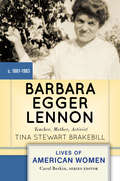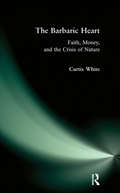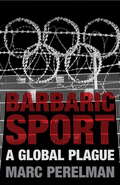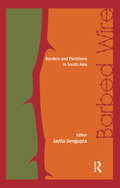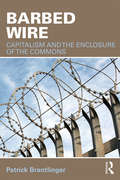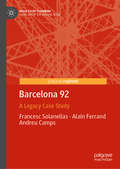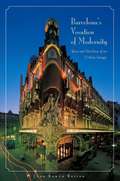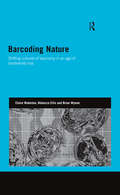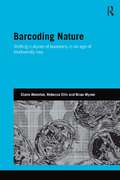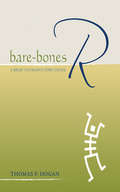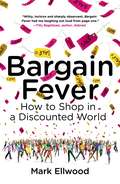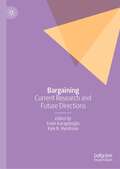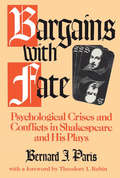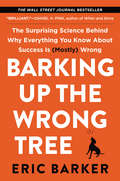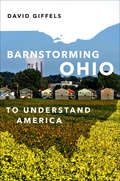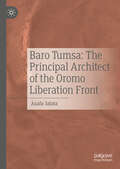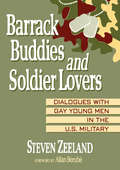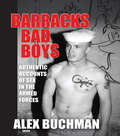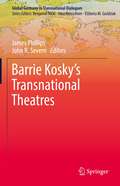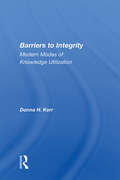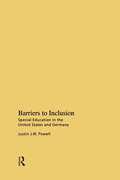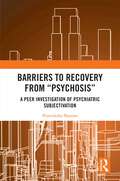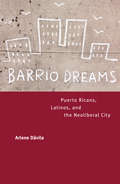- Table View
- List View
Barbara Egger Lennon: Teacher, Mother, Activist
by Tina Stewart BrakebillFacets of Barbara Egger Lennon’s life define her as an ordinary white Midwestern woman of her time: teacher, wife, mother. Her work as a union organizer and political activist, however, complicate that picture. The way in which she balanced these roles illustrates how many women of her time shaped their lives in the face of three significant forces: work, family, and politics. Enriched by years of detailed diary entries that Egger Lennon wrote, Barbara Egger Lennon: Teacher, Mother, Activist deepens our understanding of the ways in which work and political activism could exist alongside the traditional role of women in the early 20th century. About the Lives of American Women series: Selected and edited by renowned women’s historian Carol Berkin, these brief biographies are designed for use in undergraduate courses. Rather than a comprehensive approach, each biography focuses instead on a particular aspect of a women’s life that is emblematic of her time, or which made her a pivotal figure in the era. The emphasis is on a "good read,” featuring accessible writing and compelling narratives, without sacrificing sound scholarship and academic integrity. Primary sources at the end of each biography reveal the subject’s perspective in her own words. Study questions and an annotated bibliography support the student reader.
Barbaric Heart: Faith, Money, and the Crisis of Nature
by Curtis WhiteSmart, funny, and fresh, The Barbaric Heart argues that the present environmental crisis will not be resolved by the same forms of crony capitalism and managerial technocracy that created the crisis in the first place. With his trademark wit, White argues that the solution might very well come from an unexpected quarter: the arts, religion, and the realm of the moral imagination.
Barbaric Sport
by Marc PerelmanMarc Perelman pulls no punches in this succinct and searing broadside, assailing the 'recent form of barbarism' that is the global sporting event. Forget the Olympics and consider, under Perelman's guidance, the ledger of inequities maintained by such supposedly harmless games.They have provided a smokescreen for the forcible removal of 'undesirables'; aided governments in the pursuit of racist agendas; affirmed the hypocrisy of drug-testing in an industry where doping is more an imperative than an aberration; and developed the pornographic hybrid that Perelman dubs 'sporn', a further twist in our corrupt obsession with the body.Drawing examples from the modern history of the international sporting event, Perelman argues that today's colosseums, upheld as examples of 'health', have become the steamroller for a decadent age fixated on competition, fame and elitism.From the Trade Paperback edition.
Barbed Wire: Borders and Partitions in South Asia
by Jayita SenguptaThe book is an anthology of creative and critical responses to the many partitions of India within and across borders. By widening and reframing the question of partition in the subcontinent from one event in 1947 to a larger series of partitions, the book presents a deeper perspective both on the concept of partition in understanding South Asia, and understanding the implications from survivors, victims and others. The imagery of the barbed wire in the title is used precisely to confront the jaggedness of experiencing and surviving partition that still haunts the national, literary, religious and political matrices of India. The volume is a compilation of short stories, poems, articles, news reports and memoirs, with each contributor bringing forth their perception of partition and its effects on their life and identity. The many narratives amplify the human cost of partitions, examining the complexities of a bruised nation at the social, psychological and religious levels of consciousness. The book will appeal to anyone interested in literary studies, history, politics, sociology, cultural studies, and comparative literature.
Barbed Wire: Capitalism and the Enclosure of the Commons
by Patrick BrantlingerA call to transform the way we think about property, this book examines how capitalism has from its origins sought to enclose or privatize the commons, or land and other forms of property that had been viewed as communally owned, and argues that neoliberal economic policies and the corporate takeovers of urban spaces, prisons, schools, the mass media, farms, and natural resources have failed to serve the public interest. A study of corporate globalization and the continuation of empire after the era of political decolonization, it begins with the fencing of the West starting in the 1870s, and moves to examine recent phenomena such as urbanization, mass incarceration, financialization, and the treatment of people as commodities in the context of the longue durée of land enclosures, empire, and capitalism. Highlighting the threatened elimination of the public domain as a result of corporate efforts to privatize public utilities, prisons, schools, forests, seeds, and just about everything else that can yield a profit, Barbed Wire: Capitalism and the Enclosure of the Commons asks what it would mean if, instead of either private or public property, our most fundamental conception of property were communal. Would a redefinition of property from a community perspective lead us beyond the military-industrial complex?
Barcelona 92: A Legacy Case Study (Mega Event Planning)
by Francesc Solanellas Alain Ferrand Andreu CampsBarcelona 92: A Legacy Case Study examines the effects of the organisation of Barcelona’s Olympic Games in 1992. Divided into five compelling chapters, the authors discuss issues concerning the definition of legacy, whilst also presenting new models of legacy management and measurement methods, and providing an in-depth examination of sporting, economic and social dimensions. This book offers the most significant studies and research on the 92 Olympics to date, presenting cutting-edge proposals for comparing different Olympic hosting cities into the future.
Barcelona's Vocation of Modernity
by Joan Ramon ResinaSince the closing decades of the nineteenth century, Barcelona has striven to sustain an image of modernity that distinguishes itself within Spain. Barcelona's Vocation of Modernity traces the development of that image through texts that foreground key social and historical issues. It begins with Barcelona's "coming of age" in the 1888 Universal Exposition and focuses on the first major narrative work of modern Catalan literature, La febre d'or. Positing an inextricable link between literature and modernity, Resina establishes a literary framework for the evolution of the image of Barcelona's modernity through the 1980s, when the consciousness of modernity took on an ironic circularity. Because the city is an aggregation of knowledge, Resina draws from sociology, urban studies, sociolinguistics, history, psychoanalysis, and literary history to produce a complex account of Barcelona's self-reflection through culture. The last chapter offers a glimpse into the "post-historical" city, where temporality has been sacrificed to the spatialization associated with the seductions of the spectacle.
Barcoding Nature: Shifting Cultures of Taxonomy in an Age of Biodiversity Loss (Genetics And Society Ser.)
by Claire WatertonDNA Barcoding has been promoted since 2003 as a new, fast, digital genomics-based means of identifying natural species based on the idea that a small standard fragment of any organism�s genome (a so-called �micro-genome�) can faithfully identify and help to classify every species on the planet. The fear that species are becoming extinct before they have ever been known fuels barcoders, and the speed, scope, economy and �user-friendliness� claimed for DNA barcoding, as part of the larger ferment around the �genomics revolution�, has also encouraged promises that it could inspire humanity to reverse its biodiversity-destructive habits.This book is based on six years of ethnographic research on changing practices in the identification and classification of natural species. Informed both by Science and Technology Studies (STS) and the anthropology of science, the authors analyse DNA barcoding in the context of a sense of crisis � concerning global biodiversity loss, but also the felt inadequacy of taxonomic science to address such loss. The authors chart the specific changes that this innovation is propelling in the collecting, organizing, analyzing, and archiving of biological specimens and biodiversity data. As they do so they highlight the many questions, ambiguities and contradictions that accompany the quest to create a genomics-based environmental technoscience dedicated to biodiversity protection. They ask what it might mean to recognise ambiguity, contradiction, and excess more publicly as a constitutive part of this and other genomic technosciences.Barcoding Nature will be of interest to students and scholars of sociology of science, science and technology studies, politics of the environment, genomics and post-genomics, philosophy and history of biology, and the anthropology of science.
Barcoding Nature: Shifting Cultures of Taxonomy in an Age of Biodiversity Loss (Genetics and Society)
by Claire Waterton Rebecca Ellis Brian WynneDNA Barcoding has been promoted since 2003 as a new, fast, digital genomics-based means of identifying natural species based on the idea that a small standard fragment of any organism’s genome (a so-called ‘micro-genome’) can faithfully identify and help to classify every species on the planet. The fear that species are becoming extinct before they have ever been known fuels barcoders, and the speed, scope, economy and ‘user-friendliness’ claimed for DNA barcoding, as part of the larger ferment around the ‘genomics revolution’, has also encouraged promises that it could inspire humanity to reverse its biodiversity-destructive habits. This book is based on six years of ethnographic research on changing practices in the identification and classification of natural species. Informed both by Science and Technology Studies (STS) and the anthropology of science, the authors analyse DNA barcoding in the context of a sense of crisis – concerning global biodiversity loss, but also the felt inadequacy of taxonomic science to address such loss. The authors chart the specific changes that this innovation is propelling in the collecting, organizing, analyzing, and archiving of biological specimens and biodiversity data. As they do so they highlight the many questions, ambiguities and contradictions that accompany the quest to create a genomics-based environmental technoscience dedicated to biodiversity protection. They ask what it might mean to recognise ambiguity, contradiction, and excess more publicly as a constitutive part of this and other genomic technosciences. Barcoding Nature will be of interest to students and scholars of sociology of science, science and technology studies, politics of the environment, genomics and post-genomics, philosophy and history of biology, and the anthropology of science.
Bare-Bones R: A Brief Introductory Guide
by Dr Thomas P. HoganBare-Bones R provides a practical, hands-on introduction to the elements of R and R Commander. Assuming no background in computer programming, author Thomas P. Hogan guides the novice in using these valuable tools for statistical analysis. The book walks the reader through steps for downloading and then works through examples of basic statistical processing. A Student Study Site contains downloadable data sets used in the text as well as selected updates for R.
Bargain Fever
by Mark EllwoodA spirited investigation into the world of bargain hunting and how shoppers and sellers try to one-up each other When Coca-Cola offered the first retail coupon in the 1880s, customers were thrilled. But today, one in four American shoppers will buy something only if it’s on sale, and almost half of all merchandise carries a promotional price. The relentless pursuit of deals has totally disrupted the relationship between buyers and sellers. In this playful, well-researched book, journalist Mark Ellwood investigates what happens to markets when everything’s negotiable. From the haggling bazaars of Istanbul to Black Friday at a mall in upstate New York to pinnacles of global luxury such as Hermès and Louis Vuitton, sellers and shoppers are engaged in a constant game of cat and mouse. Price consultants use the latest findings in neuroeconomics to fool shoppers into thinking they’ve gotten a great deal. Consumers, on the other hand, are more empowered than ever by technology, from coupon apps to strategic Twitter analysis. And some brands resist the trend entirely, opting to set their unsold merch out to sea and shred it rather than slash prices. Enlightening as it is entertaining, Bargain Fever offers invaluable insights into how shopping works today. .
Bargain Fever
by Mark EllwoodDiscounts are no longer the exception, they're the norm. But is that bargain really a bargain? Paying full price is so passé. A quarter of the population will only open their wallets if something is on sale. Everyone wants a deal, a steal, a hookup with a discount or a way to cut costs. People don't only want a deep discount, they expect it and won't settle for anything less. They're lucky, then, that almost half of everything sold in America is listed at some kind of promotional price. It's a seismic shift that has made shoppers more savvy than ever, generating phenomena like extreme couponing, flash sales, and Groupon. So there's never been a better time to be a buyer, right? Perhaps. Sellers have developed their own tricks to protect profit margins amid such markdown mania--ones that include secret sales, shifting prices, and shredding perfectly good clothes. In this playful, deeply researched book, journalist Mark Ellwood takes a trip into this new landscape. He shows how some people are, quite literally, born to be bargain junkies thanks to a quirk of their DNA, and uncovers the sales-driven sleights of hand that sellers employ to hoodwink unsuspecting buyers. Ellwood takes us from the floor of upscale department store Bergdorf Goodman to the bustling aisles of a Turkish bazaar, from the outlet Disney world of rural Pennsylvania to a town in Florida that can claim to be couponing's spiritual capital. We meet savvy buyers trying to wring value from every cent--stalking fashion editors' tweets to learn about sample sales or camping out overnight for a cut-price computer. Ellwood also uncovers the dark side of discounting: how organized crime steals coupons en masse and how certain boutiques limit discounts to VIPs, running secret sticker promotions from which the ordinary shopper is excluded. Bargain Fever is a manual for thriving in this new era, when deal hunting has gone from being a sign of indigence to one of intelligence. There's never been a better time to be a buyer--at least if you know how the game works.
Bargaining: Current Research and Future Directions
by Emin Karagözoğlu Kyle B. HyndmanThis Edited Collection provides a rigorous and rich overview of current bargaining research in economics and related disciplines, as well as a discussion of future directions. The Editors create cross-disciplinary and cross-methodological synergies by bringing together bargaining researchers from various fields, including game theory, experimental economics, political economy, autonomous negotiations, artificial intelligence, environmental economics and behavioral operations management; as well as using various methods, including the strategic approach, axiomatic approach, empirical research, lab and field experiments, machine learning and decision support systems. Offering insights into the theoretical foundations of bargaining research, traditional applications to bargaining research and topics of growing importance due to new advances in technology and the changing political and physical landscape of the world, this book is a key tool for anyone working on or interested in bargaining.
Bargains with Fate: Psychological Crises and Conflicts in Shakespeare and His Plays
by Maria JaroszThe enduring appeal of Shakespeare's works derives largely from the fact that they contain brilliantly drawn characters. Interpretations of these characters are products of changing modes of thought, and thus past explanations of their behavior, including Shakespeare's, no longer satisfy us. In this work, Bernard J. Paris, an eminent Shakespearean scholar, shows how Shakespeare endowed his tragic heroes with enduring human qualities that have made them relevant to people of later eras.Bargains with Fate employs a psychoanalytic approach inspired by the theories of Karen Horney to analyze Shakespeare's four major tragedies and the personality that can be inferred from all of his works. This compelling study first examines the tragedies as dramas about individuals with conflicts like our own who are in a state of crisis due to the breakdown of their bargains with fate, a belief that they can magically control their destinies by living up to the dictates of their defensive strategies.Filled with bold hypotheses supported by carefully detailed accounts, this innovative study is a resource for students and scholars of Shakespeare, and for those interested in literature as a source of psychological insight. The author's combination of literary and psychoanalytic perspectives guides us to a humane understanding of Shakespeare and his protagonists, and, in turn, to a more profound knowledge of ourselves and human behavior.
Barking Up the Wrong Tree: The Surprising Science Behind Why Everything You Know About Success Is (Mostly) Wrong
by Eric BarkerMuch of the advice we’ve been told about achievement is logical, earnest…and downright wrong. In Barking Up the Wrong Tree, Eric Barker reveals the extraordinary science behind what actually determines success and most importantly, how anyone can achieve it. You’ll learn:• Why valedictorians rarely become millionaires, and how your biggest weakness might actually be your greatest strength • Whether nice guys finish last and why the best lessons about cooperation come from gang members, pirates, and serial killers• Why trying to increase confidence fails and how Buddhist philosophy holds a superior solution• The secret ingredient to “grit” that Navy SEALs and disaster survivors leverage to keep going• How to find work-life balance using the strategy of Genghis Khan, the errors of Albert Einstein, and a little lesson from Spider-ManBy looking at what separates the extremely successful from the rest of us, we learn what we can do to be more like them—and find out in some cases why it’s good that we aren’t. Barking Up the Wrong Tree draws on startling statistics and surprising anecdotes to help you understand what works and what doesn’t so you can stop guessing at success and start living the life you want.
Barnstorming Ohio: To Understand America
by David GiffelsAn on-the-ground look at the diverse challenges facing Ohio, in light of its national significance as the state that has aligned with presidential election winners more than any other -- from an award-winning author and essayist dubbed "the Bard of Akron" (New York Times).The question of America's identity has rarely been more urgent than now, and no American place has ever been more reflective of that identity than Ohio. David Giffels, a lifelong resident of the "bellwether" state, has spent a quarter century writing and thinking about what it means to live in what he calls "an all-American buffet, an uncannily complete everyplace." With Cleveland as the end of the North, Cincinnati as the beginning of the South, Youngstown as the end of the East, and Hicksville (yes, Hicksville) as the beginning of the Midwest, Ohio offers important insight into the state of the nation.As a historic 2020 presidential election approaches, Barnstorming Ohio is Giffels' account of a year on Ohio's roads, visiting people and places that offer valuable reflections of the national questions and concerns, as well as astounding electoral clairvoyance -- since 1896, Ohio has accurately chosen the winner in twenty-nine of thirty-one presidential elections, more than any other state.With lyricism and a native's keen eye, Barnstorming Ohio takes readers into the living room of a man whose life was upended just shy of retirement by General Motors' shutdown of its Lordstown assembly plant. It offers an exclusive view into the presidential campaign of Ohio Democratic hopeful Tim Ryan. It takes us into the sodden soybean fields of farmers struggling to outlast the dual punch of a protracted trade war and historic rainfall, and to an indie rock music festival in Dayton a week after a mass shooting there. We enter the otherworld of long-dormant shopping malls as Amazon transforms them into vast new fulfillment centers. On the lighter side, Giffels makes a "beer run" into Ohio's booming craft brewing industry and revisits the legend (and the bird-nest toupee) of Jim Traficant, a larger-than-life Ohio politician whom many have called the "proto-Trump."In a year when Americans are seeking answers, Barnstorming Ohio offers rare and carefully nuanced access to the people who have always held them.
Baro Tumsa: The Principal Architect of the Oromo Liberation Front
by Asafa JalataThis book identifies and examines the role of Baro Tumsa in clandestinely bringing together a few Oromo nationalists of diverse backgrounds from all over Oromia, the Oromo country, to establish the Oromo Liberation Front (OLF) between the late 1960s and the mid- 1970s in Oromia and Ethiopia. The Haile Selassie government's destruction of Oromo movements, mainly the Macha-Tulama Self-Help Association (MTA), was an immediate reason for the birth of the front. While most Oromos have supported and sympathized with this liberation organization, the colonizers and their agents have vilified and attacked it to make the Oromo society leaderless. For almost a half-century, the OLF has been struggling to uproot Ethiopian (Amhara-Tigray) settler colonialism and its institutions from Oromia to end the domination and exploitation of the Oromo. The book also examines the roles of leaders and social movements in organizing oppressed peoples for collective actions by creating organizations that have visions and missions to liberate themselves. It is a case study of global social movements and leadership studies.
Barrack Buddies and Soldier Lovers: Dialogues With Gay Young Men in the U.S. Military
by Steven ZeelandAmong all the literature published on gays in the military, Steven Zeeland’s first book remains one of a kind. Barrack Buddies and Soldier Lovers is a raw, unsanitized personal record of conversations the author had with young soldiers and airmen stationed in Frankfurt, Germany. Zeeland’s intimate involvement with these men enabled him to document in honest, visceral terms the day-to-day reality of gay military men’s lives and how they work, play, and, in many instances, how the military actually helped them come out. Ironically, despite the military’s antigay policies, these men found that military service placed them in environments where they had to come to terms with their erotic feelings for other men, and sent them overseas to places where they found greater freedom to explore their sexuality than they could have back home. While a few of Zeeland’s buddies were targeted for discharge, most portray an atmosphere of sexually tense tolerance and reveal a surprising degree of openness with straight co-workers and roommates.The 16 fascinating interviews in Barrack Buddies and Soldier Lovers challenge popular assumptions and stereotypes about gay men in the military and provide significant information on: gay military sexual networks male sexual fluidity in barracks life strategies for survival as a gay or bisexual male in the U.S. military German-American relations attitudes toward the gay banThe casual, conversational structure of Barrack Buddies and Soldier Lovers makes it a richly entertaining read. No other book provides such a warm and intimate portrait of the lives of young gay soldiers and airmen.Visit Steven Zeeland at his home page: http://www.stevenzeeland.com
Barracks Bad Boys: Authentic Accounts of Sex in the Armed Forces
by Alex BuchmanUnmistakably original, utterly heartfelt, stranger than fiction, hotter than any off-the-rack gay fantasy! Building on the success of his extraordinary debut-the critically acclaimed, #1 "men&’s interest" bestseller A Night in the Barracks-former U.S. Marine Alex Buchman presents a spellbinding, startlingly unique collection of erotic memoirs by or about "bad boys" in the Armed Forces. Buchman&’s radical approach to an otherwise rigidly formulaic sub-genre: he does the legion of purportedly "true confessions" books with a military theme one better: the first-person narratives he has assembled actually are true. Boldly defying the conventions of gay male "one-handed reading," the unembellished chronicles Buchman brings us from the intensely homoerotic secret world of men in uniform are more erotically charged than any porn-by-numbers fantasy. The theme of Barracks Bad Boys is trouble. All-too-true stories of criminally sexy soldiers and sailors in trouble, who cause trouble, or who just plain are trouble. The unvarnished accounts of romance with baby-faced deserters bound for the brig make for riveting reading. Equally gripping is the disarmingly candid pillow talk of young military men whose trouble runs deeper than mere "unauthorized absence" or "indecent acts." Some of the surprises you&’ll encounter in Barracks Bad Boys include: a straight, married soldier&’s detailed description of his one and only sexual experience with another man a seasoned military chaser&’s review of his all-time favorite sailor-hustlers a dazed gay studies author&’s "I should have known better" journal documenting how young sailors half his age seduced him, gave him street drugs, and pressured him to videotape them performing lewd acts Editor Buchman&’s own offbeat and powerful story of being taken by surprise by the sexual advance of a Marine sergeant who began rubbing Buchman&’s chest and asking him if he felt an "urge to be evil . . ." By turns hair-raising and wrenching, poignant and laugh-out-loud funny, these authentic accounts of sex in the Armed Forces are sure to elicit one universal reaction: no one could make this up! Barracks Bad Boys is compulsory reading for anyone interested in men in uniform; human sexuality in the military; and cutting-edge nonfiction literary erotica.
Barrie Kosky’s Transnational Theatres (Global Germany in Transnational Dialogues)
by James Phillips John R. SevernThis book, the first of its kind, surveys the career of the renowned Australian-German theatre and opera director Barrie Kosky. Its nine chapters provide multidisciplinary analyses of Barrie Kosky’s working practices and stage productions, from the beginning of his career in Melbourne to his current roles as Head of the Komische Oper Berlin and as a guest director in international demand. Specialists in theatre studies, opera studies, musical theatre studies, aesthetics, and arts administration offer in-depth accounts of Kosky’s unusually wide-ranging engagements with the performing arts – as a director of spoken theatre, operas, musicals, operettas, as an adaptor, a performer, a writer, and an arts manager. Further, this book includes contributions from theatre practitioners with first-hand experience of collaborating with Kosky in the 1990s, who draw on interviews with members of Gilgul, Australia’s first Jewish theatre company, to document this formative period in Kosky’s career. The book investigates the ways in which Kosky has created transnational theatres, through introducing European themes and theatre techniques to his Australian work or through bringing fresh voices to the national dialogue in Germany’s theatre landscape. An appendix contains a timeline and guide to Kosky’s productions to date.
Barriers To Integrity: Modern Modes Of Knowledge Utilization
by Donna H. KerrIn the world of Aristotle, the education of individuals might have led to virtuous action. But today, integrity of action also requires the education of institutions. Those very structures designed to enhance the just use of knowledge too often stand instead as barriers to integrity. Bureaucracy shapes our actions in a manner reflective of a Platonic approach to knowledge and the political order—an approach that labels some as "true knowers" and grants them the ultimate power to decide what is to be done. Professionalism, the institution with which we legitimatize and use expertise, imbues our actions with the Aquinian belief that any disobedience of directives from reigning experts risks (unacceptably) the loss of order. In our research system, representing our main collective effort to generate new knowledge, we unwittingly put into practice Hume's conception of knowledge, which takes the outcomes of science to be an accumulation of facts, and John Stuart Mill's political theory, which overlooks the role of community in the lives of individuals. The stakes are high, argues Dr. Kerr. Given these conceptions of knowledge and the political values that are inherent in our primary modes of knowledge utilization—conceptions that we should not embrace—only with fundamental reforms of our institutions can our society hope to gain integrity. Dr. Kerr discusses how bureaucracy, professionalism, and the research system could be altered so that they might structure actions in more defensible and desirable ways.
Barriers to Inclusion: Special Education in the United States and Germany
by Justin J. PowellBarriers to Inclusion offers a comparative and historical account of the rise of special education over the twentieth century in the United States and Germany. This institutional analysis demonstrates how categorical boundaries, professional groups, social movements, and education and social policies shaped the schooling of children and youth with disabilities. It traces the evolution of special education classification, explores growing special education organizations, and examines students' learning opportunities and educational attainments. Highlighting cross-national differences over time, the author also investigates demographic and geographic variability within the federal democracies, especially in segregation and inclusion rates of disabled and disadvantaged children. Germany's elaborate system of segregated special school types contrasts with diverse American special education classrooms mainly within regular schools. Joining historical case studies with empirical indicators, this book reveals persistent barriers to school integration as well as factors that facilitate inclusive education reform in both societies.
Barriers to Recovery from ‘Psychosis’: A Peer Investigation of Psychiatric Subjectivation
by Prateeksha SharmaThis book inaugurates the field of Mad Studies in the Indian subcontinent investigating the barriers to recovery from the perspective of "patients" and caregivers. Offering a radical critique of the mental health system, it questions why the phenomenon of recovery from serious mental health issues is not more widespread. Drawing from narratives of "patients", evidence from lived experiences around the globe and literature on recovery in psychiatry, mental health legislations and policies, it establishes the hitherto silenced voice of the "patient" as having testimonial viability, via an emancipatory scholarship. It highlights the repeated marginalization of "patients" and the identity prejudice they experience in day-to-day situations as a form of epistemic violence. The book examines the barriers to recovery through an interdisciplinary investigation, scrutinizing relationships between individuals and institutions at interpersonal, intersocial and global levels. The book will be of interest to researchers and scholars of psychiatry, psychology, anthropology, sociology, disability studies, Mad Studies, law and policy, cultural studies, mental health, medicine as well as general readers.
Barrio America: How Latino Immigrants Saved the American City
by A. K. Sandoval-StrauszThe compelling history of how Latino immigrants revitalized the nation's cities after decades of disinvestment and white flight Thirty years ago, most people were ready to give up on American cities. We are commonly told that it was a "creative class" of young professionals who revived a moribund urban America in the 1990s and 2000s. But this stunning reversal owes much more to another, far less visible group: Latino and Latina newcomers.Award-winning historian A. K. Sandoval-Strausz reveals this history by focusing on two barrios: Chicago's Little Village and Dallas's Oak Cliff. These neighborhoods lost residents and jobs for decades before Latin American immigration turned them around beginning in the 1970s. As Sandoval-Strausz shows, Latinos made cities dynamic, stable, and safe by purchasing homes, opening businesses, and reviving street life. Barrio America uses vivid oral histories and detailed statistics to show how the great Latino migrations transformed America for the better.
Barrio Dreams
by Arlene DávilaArlene Dávila brilliantly considers the cultural politics of urban space in this lively exploration of Puerto Rican and Latino experience in New York, the global center of culture and consumption, where Latinos are now the biggest minority group. Analyzing the simultaneous gentrification and Latinization of what is known as El Barrio or Spanish Harlem, Barrio Dreams makes a compelling case that--despite neoliberalism's race-and ethnicity-free tenets--dreams of economic empowerment are never devoid of distinct racial and ethnic considerations. Dávila scrutinizes dramatic shifts in housing, the growth of charter schools, and the enactment of Empowerment Zone legislation that promises upward mobility and empowerment while shutting out many longtime residents. Foregrounding privatization and consumption, she offers an innovative look at the marketing of Latino space. She emphasizes class among Latinos while touching on black-Latino and Mexican-Puerto Rican relations. Providing a unique multifaceted view of the place of Latinos in the changing urban landscape, Barrio Dreams is one of the most nuanced and original examinations of the complex social and economic forces shaping our cities today.
